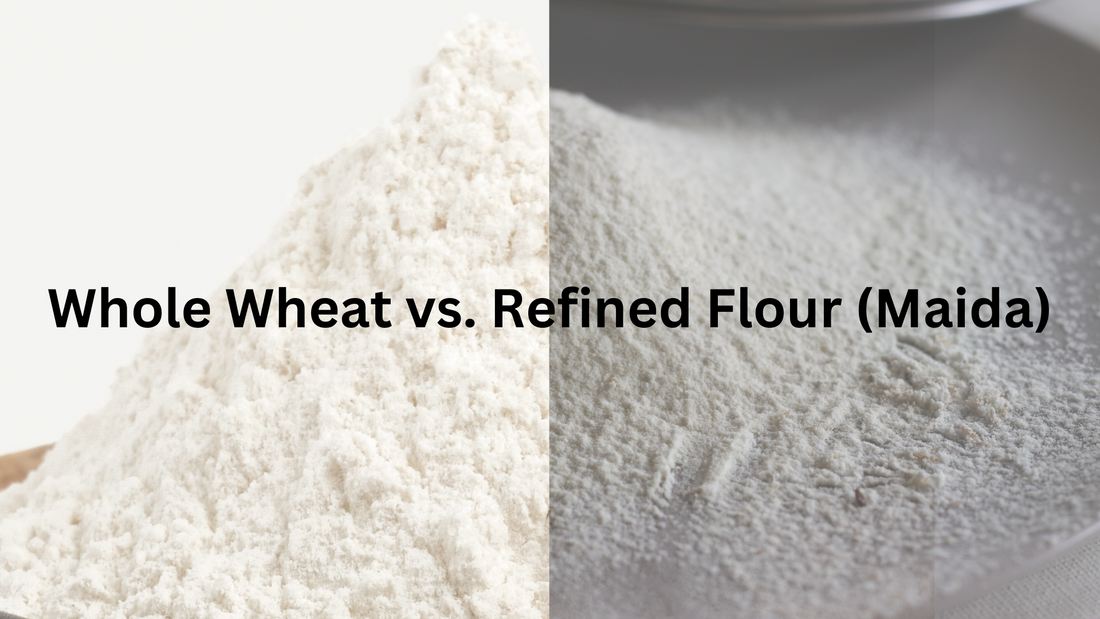Introduction:
In the realm of dietary choices, the selection of grains plays a pivotal role in determining our overall health. The debate between whole wheat and refined flour (commonly known as Maida) has garnered significant attention due to their differing nutritional compositions and potential health impacts. Understanding the benefits of whole wheat over refined flour is crucial for making informed dietary decisions. Let’s delve into this discourse to unravel the nutritional superiority of whole wheat and its multifaceted advantages.
Whole Wheat: A Nutritional Powerhouse
Whole wheat is derived from the entire wheat kernel, containing three integral parts – the bran, germ, and endosperm. This composition retains essential nutrients such as fiber, vitamins, minerals, and phytochemicals.
Abundance of Fiber:
The presence of dietary fiber in whole wheat aids digestion, promotes satiety, and regulates blood sugar levels. According to the USDA, one cup of whole wheat flour contains about 12.8 grams of fiber, whereas the refining process strips refined flour of most fiber content, leaving a mere 3 grams per cup.
Vital Nutrients:
Whole wheat is a rich source of nutrients like B vitamins (folate, thiamine, and B6), iron, magnesium, and selenium, which are often lost during the refining process of Maida. These nutrients play pivotal roles in energy metabolism, immune function, and overall health maintenance.
Low Glycemic Index:
Whole wheat possesses a lower glycemic index compared to refined flour. Foods with a lower glycemic index help control blood sugar levels, reducing the risk of diabetes and promoting better weight management.
Health Benefits of Choosing Whole Wheat Over Refined Flour (Maida)
Weight Management and Satiety:
The higher fiber content in whole wheat contributes to a feeling of fullness, aiding in weight management by reducing overeating and cravings.
Improved Digestive Health:
The fiber in whole wheat supports digestive health by preventing constipation and promoting a healthy gut microbiome, which in turn may reduce the risk of gastrointestinal issues.
Reduced Risk of Chronic Diseases:
Studies have suggested that incorporating whole grains like whole wheat into the diet may lower the risk of chronic diseases such as heart disease, certain cancers, and stroke due to its nutrient-rich profile.
Conclusion:
The advantages of whole wheat over refined flour (Maida) are undeniably significant when considering the nutritional value and potential health benefits. Opting for whole wheat products can be a pivotal step toward fostering a balanced and wholesome diet, contributing to overall well-being and mitigating the risk of various health conditions.
References:
Harvard T.H. Chan School of Public Health. (n.d.). The Nutrition Source - Whole Grains. https://www.hsph.harvard.edu/nutritionsource/whole-grains/
U.S. Department of Agriculture (USDA). (n.d.). FoodData Central. https://fdc.nal.usda.gov/
Aune, D., et al. (2016). Whole grain consumption and risk of cardiovascular disease, cancer, and all cause and cause specific mortality: systematic review and dose-response meta-analysis of prospective studies. BMJ, 353, i2716. https://www.bmj.com/content/353/bmj.i2716

